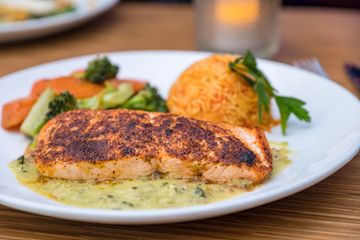Discover why churros are beloved by all after every dinner
Wiki Article
Is Mexican Food Healthy And Balanced? Unloading the Nutritional Perks of Typical Ingredients
The inquiry of whether Mexican food is healthy welcomes an expedition of its conventional ingredients. Beans and corn serve as foundational staples, abundant in protein and fiber. Avocados give advantageous fats, while different natural herbs and seasonings include flavor and health advantages - freshly made guacamole. With each other, these parts create a tapestry of nourishment. The healthiness of Mexican food typically depends on preparation approaches and section dimensions. What role do these aspects play in determining its total nutritional value?The Power of Beans: Healthy Protein and Fiber-Rich Staples
Frequently overlooked, beans offer as a foundation of Mexican cuisine, providing a riches of nutritional benefits. Rich in protein, they are an outstanding plant-based option for those looking for to meet their dietary healthy protein requires. This high healthy protein content supports muscle mass repair work and development, making beans vital for both meat-eaters and vegetarians alike. In addition, beans are a phenomenal source of dietary fiber, which helps in food digestion and advertises a sensation of fullness, potentially assisting with weight monitoring.The range of beans used in Mexican meals, such as black beans, pinto beans, and kidney beans, adds to a diverse taste profile and can boost meals nutritionally. Beans are reduced in fat and have vital vitamins and minerals, consisting of magnesium, iron, and folate. Together, these qualities make beans a vital component, providing both nutrition and nourishment in traditional Mexican fare.

Corn: a Versatile Grain With Nutritional Advantages
Corn sticks out as a flexible grain basic to Mexican cuisine, commemorated not only for its cooking applications however additionally for its remarkable dietary profile. As a primary ingredient in meals like tortillas, tamales, and pozole, corn provides necessary nutrients that add to a balanced diet regimen. Rich in carbs, it offers as a significant energy source, while also being reduced in fat, making it a favorable choice for various dietary needs.In addition, corn is a great source of dietary fiber, which assists in digestion and advertises satiation. It includes substantial quantities of vitamins such as B-complex vitamins, which are crucial for energy metabolic rate. The visibility of anti-oxidants, especially carotenoids, adds to total health and wellness by decreasing oxidative tension. In addition, corn is gluten-free, catering to those with gluten sensitivities. Generally, the nutritional advantages of corn emphasize its significance in traditional Mexican food and its function in a healthy and balanced diet regimen.
Avocados: Healthy Fats and Nutrients in Every Bite
Avocados play a considerable role in Mexican cuisine, enhancing recipes with their velvety appearance and rich flavor. Past their culinary appeal, avocados are commemorated for their impressive dietary account. They are an abundant resource of healthy monounsaturated fats, which can help lower negative cholesterol degrees and support heart health. Additionally, avocados are loaded with important vitamins and minerals, including potassium, vitamin E, and B vitamins, adding to total wellness.The high fiber content in avocados aids food digestion and promotes satiation, making them a useful enhancement to any kind of dish. Their distinct nutrient make-up can additionally sustain skin health and offer anti-inflammatory advantages. Including avocados into standard Mexican recipes or enjoying them as a standalone snack can improve both taste and nourishment, showing why they are a precious staple in Mexican cuisine. In general, avocados provide a scrumptious means to take pleasure in healthy and balanced fats and vital nutrients in every bite.
Herbs and flavors: Flavorful Wellness Boosters
While enjoying the rich flavors of Mexican food, one can not ignore the essential role that spices and herbs play in boosting both taste and health. Active ingredients such as chili, cilantro, and oregano peppers not just add to the dynamic taste account but additionally provide substantial health and wellness benefits. Cilantro is known for its detoxing buildings, assisting to eliminate hefty metals from the body, while oregano is loaded with antioxidants and possesses anti-inflammatory effects.Chili peppers, a staple in numerous Mexican dishes, consist of capsaicin, which has been connected to enhanced metabolic process and pain alleviation. Additionally, seasonings like cumin and coriander support food digestion and might assist in blood sugar policy. Including these savory health boosters right into meals not just improves the culinary experience yet additionally advertises overall wellness, making Mexican cuisine not simply scrumptious, however additionally nutritionally advantageous.
Conventional Cooking Techniques: Enhancing Nutrition and Taste
Conventional cooking approaches in Mexican food play a necessary duty in improving both nourishment and taste, as they commonly prioritize fresh components and classic techniques. Methods such as nixtamalization, where corn is saturated and prepared in an alkaline option, not just improve the nutrient profile of tortillas yet also boost their digestibility - lunch and dinner. Furthermore, making use of slow-moving cooking approaches, like cooking or braising, allows tastes to meld wonderfully while preserving the integrity of the components
Regularly Asked Inquiries
Are Mexican Food Portions Commonly Larger Than Other Cuisines?
Mexican food sections are often bigger than those of lots of other foods. This particular mirrors typical eating practices, emphasizing common sharing and hearty dishes, which can result in a much more considerable serving dimension in general.
How Does the Prep Work Method Affect Healthfulness of Mexican Food?
Prep work approaches substantially affect the healthfulness of Mexican food. Techniques such as grilling or steaming protect nutrients, while frying can raise unhealthy fat material. Options of active ingredients and cooking designs ultimately figure out overall dietary worth.Can Mexican Food Be Tailored for Specific Dietary Constraints?
Mexican food can undoubtedly be customized for specific nutritional limitations. Substitutions, such as making use of corn tortillas for gluten-free diet plans or incorporating even more veggies, allow individuals to delight in typical flavors while accommodating different nutritional demands.What Are Usual Misconceptions Concerning Mexican Food and Wellness?
Typical mistaken beliefs concerning Mexican food consist of the idea that it is naturally unhealthy, overly churros hot, and entirely concentrated on fats. In truth, typical dishes often feature healthy active ingredients and can be customized to various nutritional demands.Exist Much Healthier Alternatives at Mexican Dining Establishments?
Healthier options at Mexican dining establishments frequently consist of smoked meats, beans, and fresh vegetables. Selecting recipes that emphasize whole components and avoiding heavy sauces can lead to an extra nutritious dining experience, promoting overall well-being.The range of beans utilized in Mexican dishes, such as black beans, pinto beans, and kidney beans, adds to a diverse taste account and can boost meals nutritionally. Avocados play a significant function in Mexican food, complementing meals with their luscious appearance and abundant taste. Including avocados into conventional Mexican recipes or appreciating them as a standalone snack can improve both flavor and nutrition, demonstrating why they are a precious staple in Mexican food. While delighting in the rich flavors of Mexican cuisine, one can not neglect the essential role that spices and herbs play in boosting both taste and wellness. Standard cooking approaches in Mexican food play a vital duty in improving both nutrition and taste, as they frequently focus on fresh components and time-honored methods.
Report this wiki page